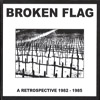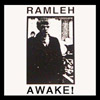 Ramleh and Broken Flag have seen a resurgence in the past few years, largely due to the three day Never Say When festival in the UK this past May (for which both of these releases were compiled), but also in a recent reactivation of Gary Mundy's seminal noise (and sometimes rock) project. While Mundy and current partner in crime Anthony DiFranco are moving onward with new material, these sets are an essential documentation of the band, and label’s past, as well as an often overlooked piece of early industrial culture.
Ramleh and Broken Flag have seen a resurgence in the past few years, largely due to the three day Never Say When festival in the UK this past May (for which both of these releases were compiled), but also in a recent reactivation of Gary Mundy's seminal noise (and sometimes rock) project. While Mundy and current partner in crime Anthony DiFranco are moving onward with new material, these sets are an essential documentation of the band, and label’s past, as well as an often overlooked piece of early industrial culture.
Broken Flag/Vinyl-on-Demand/Harbinger Sound
Broken Flag formed in 1982, not long after Industrial Records and Come Organisation paved the way for the DIY aesthetic teamed with raw, industrial noise that would eventually be labeled Power Electronics.While the former’s partnership with Mute, and the latter's diligent work by founder William Bennett kept large chunks of their catalogs available, much of the material Mundy's label had largely disappeared, save for small, isolated chunks and occasional reissues.  These two sets give a strong reintroduction to the label, as well as an almost obsessive plunging into the first phase of Ramleh's existence.
Broken Flag:A Retrospective, originally issued in 2007 on vinyl is just that:a selection of tracks and pieces from a variety of artists associated with the label.The first disc and a half are dedicated to the Italian wing of Broken Flag:Giancarlo Toniutti, Maurizio Bianchi, and Mauthausen Orchestra (the late Pierpaolo Zoppo).Each stand on their own:Toniutti's dissonant, slightly musical synth experiments feel more structured and academic than many here, Bianchi's dour, echo drenched electronics (in the form of a long piece from the SFAG remix album, and a shorter compilation track), and Zoppo's combination of minimal textures and redlining harshness all sound unique, but are unified by a distinct sense of depression and dread.
Le Syndicat's material, culled from a compilation and the Rectal Struggle tape, sound more in-line with those early industrial projects, and the directly antecedent German power electronics scene (Genocide Organ, Tesco Industries, etc), mixing heavily distorted rhythms with feedback and pure sheets noise, most obvious on "Zirkel Children" and "The Wall."The US is represented by early noise stalwarts Controlled Bleeding, in the form of two long pieces from the Distress Signals tape.Clearly recorded before the more jazz-influenced sound took hold, the duo of Paul Lemos and Chris Moriarty throw down on two relentlessly harsh pieces, albeit with a buried hint of rhythm, metallic as well as synthetic.
Un-Kommuniti, the pre-Stereolab project from Tim Gane, appears as extracts from Mindretch, and it clearly shows hints of the more structured, musical direction he would eventually go.The diverse, synth bass driven "Destroy the Spectacle" and almost song-like "Doktrine 1" are the most complex recordings in this set, while still retaining that harsh, noisy edge.
Mundy's own work is represented in a selection of early Ramleh tracks (all of which appear on the Alive! box set), and also two tracks from his Kleistwahr alias.Neither "Myth Part 4-6" and "Fuck You All" are significantly removed from Ramleh sonically, but are more expansive and complex than the shorter material issued by his "main" band.The latter especially stands out as an endurance test of shrill tones that only relent about half way through.(I think I know where Prurient got the idea for "Roman Shower.")The only full work included is a nearly 30 minute track from Male Rape Group, their only composition "On to 83," which was a duo of Mundy and Philip Best.Due to its length and intensity, it is more in league with the likes of Merzbow or Hijokaidan than traditional power electronics, which is what makes it stand out, if for nothing else than its unadulterated brutality.
Closing the final disc is a pseudo-compilation of artists that were associated with the label, though not to the extent of others.Best's own Consumer Electronics has a painfully brief (minute and a half) submission of "Filthy Art," which not only shows he was an expert at sleazy noise as a teenager, but that his vocals have retained their intensity three decades later.Sutcliffe Jugend’s "Bloodfucking" is much more restrained sonically than its title would indicate, and is in line with their early works.The two short, strange pieces from Falx Cerebri ("Fucking World" and "Heartbeat") differ greatly, with the former being oddly percussive and bizarre, while the latter feels more like noise by the numbers.A short live performance by Vortex Campaign, Mundy's early attempts at a rock band, Toll, as well as an early track by the New Blockaders, "X-Nihilist Assault," demonstrating their proficiency at balancing pure noise and droning spaces, rounds out the set.
In an unprecedented move, the Vinyl-on-Demand label saw fit to reissue the previously vinyl only work on CD.Content-wise, it is identical (save for the limited 7" Ramleh tracks), and while the packaging is comparatively more Spartan, it still exudes quality:heavy flap-top box holding the five discs in hardback book style digipaks, and a scaled-down version of the original liner notes, complete with Mundy's commentary on the label discography.As a fan of most of the VOD label's output, I hope some of their other luxurious releases make the same transition to digital…the lower cost of both the packaging and the shipping would cause me to pick up quite a few releases.
The only weak facet of Broken Flag:A Retrospective, is that it is a mere sampling of the label’s massive discography, making wish there was more included.However, the stand-alone Ramleh box by Harbinger Sound certainly does not have that same caveat attached.

Initially a duo of Gary Mundy and Bob Strudwick, the latter replaced by Jerome Clegg not long after, Ramleh's Awake! is actually an expanded reissue of a six cassette box set released in 1985, comprising all Ramleh recordings between 1982 and then, and intended as a symbolic closure to that phase of the label.Ramleh's sound differed a lot from their contemporaries like Whitehouse in the fact that it just sounded dirty.Whitehouse records in the early 1980s were harsh and brutal, but overall had a clean, pure quality to them, compared to Ramleh's ragged, filthy noises.If Whitehouse was a sharp, steel scalpel, Mundy and company were a rusty, serrated blade.Additionally, Ramleh also had a certain psychedelic feel to them.Not quite as pronounced as later noise artists like CCCC or Astro, but a noticeable use of flanging and echo to give them a distinct edge, with an overall mood that blended the futile depression of Maurizio Bianchi with the seething rage of Whitehouse.
Many of the tracks that make up the early portions of this disc share more in common with the world of harsh noise than what is now known as power electronics, since they trade in shrill feedback layers and sustained layers of static, rather than the hinted at rhythms and structures that PE is more associated with, although the use of screamed, unintelligible vocals are a trademark of the genre.
The earlier discs in the set unsurprisingly sound the most primitive, largely recorded on a cheap home four track or in questionable live circumstances, but the material on the final two discs, recorded in a proper studio, let the essence of Ramleh shine through, and also show that the transition from power electronics to heavy drone rock was not that drastic."Backlash" and "Anything Is Mine" are the clearest examples:cleaner production and what sounds like the use of a bass guitar in addition to the feedback and synth squall give a greater sense of structure, but also the fact that Mundy's vocals are relatively clear solidifies this, since rather than just manic screaming there is some almost "singing" going on here.
The sprawl of Awake! may make it a daunting task for the average listener...not only are there ten different versions of "Phenol" (although they barely resemble one another since most are live recordings), but there is also a good deal of overlap in other places, such as the two separate live at Morden Tower recordings, one official, and one bootleg, and two separate recordings of the band’s performance at the infamous Equinox Event in 1982.However, due to this thoroughness, moments like Philip Best talking to the sound guy at the end of the Clarendon Hotel performance about how he needs to turn things up louder for Whitehouse, who were "better" in his words (although Best has been a member of both, then and more recently), and other historical curiosities.
It is also to see a band that worked in "shock" tactics owning up to that part of their history.Rather than ignoring some of the intentional fascist overtones to their work, such as the references to Eichmann's execution (the first cassette was released on the 20th anniversary of this, which took place in Ramleh, Israel) and the inclusion of the Rockwell Hate tape (where the band contributed a noise backing to a George Lincoln Rockwell taped speech, himself the head of the American Nazi Party), they present them as they were 30 years ago.Mundy makes no apology for that period, but acknowledges their intent as being the work of teenagers looking to stir up trouble, hence the imagery.
The box itself is a luxurious package: a glossy 10" box with each disc in its own digipak, a large, detailed book outlining all of the included recordings, a poster, an art print by occasional Ramleh member Philip Best, and a few buttons.A far cry from the hand-dubbed Xeroxed tapes of the original releases.However, like the original cassette box, the eight discs come in identical digipaks, meaning the only way of identifying them is the catalog numbers on the discs themselves, and the track list in the booklet.Included within the booklet also is a large selection of scanned mailing lists, gig fliers, cassette artwork, articles/interviews (including two long form pieces by Paul Lemos), and some original hand-written lyrics from Mundy.
As far as historical documentation goes, the Ramleh/Broken Flag scene has gone from an extremely sparse footnote to a rich history within the span of a year or so:preceding these two boxes, and the UK festival, was a massive feature in the first (and currently only) issue of As Loud As Possible, providing an even further reaching commentary on both the releases and projects covered.All three combined makes for a comprehensive snapshot on what was a criminally underrated piece of noise history.
Hopefully this resurgence will continue on with newer Ramleh recordings, both of the power electronics and rock variety.Actually, blending the two projects has also demonstrated some great potential:the first part of the final track on 2009's Valediction album melded the two styles to wonderful effect.For the uninitiated, the Broken Flag Retrospective is probably the more welcoming introduction, as Awake! is so sprawling and obsessive in its thoroughness.However, it is for that reason that it is such an effective document, and proudly sits alongside the Incapacitants Box is Stupid and Hijokaidan The Noise sets in my collection as brilliant collections that emphasize the artistic side of a genre many refuse to acknowledge.
samples (Broken Flag: An Anthology):
- Controlled Bleeding - "Only Obeyed Orders"
- Un-Kommuniti - "Destroy The Spectacle"
- The New Blockaders - "X-Nihilist Assault"
samples (Ramleh - Awake!):
 
Read More

